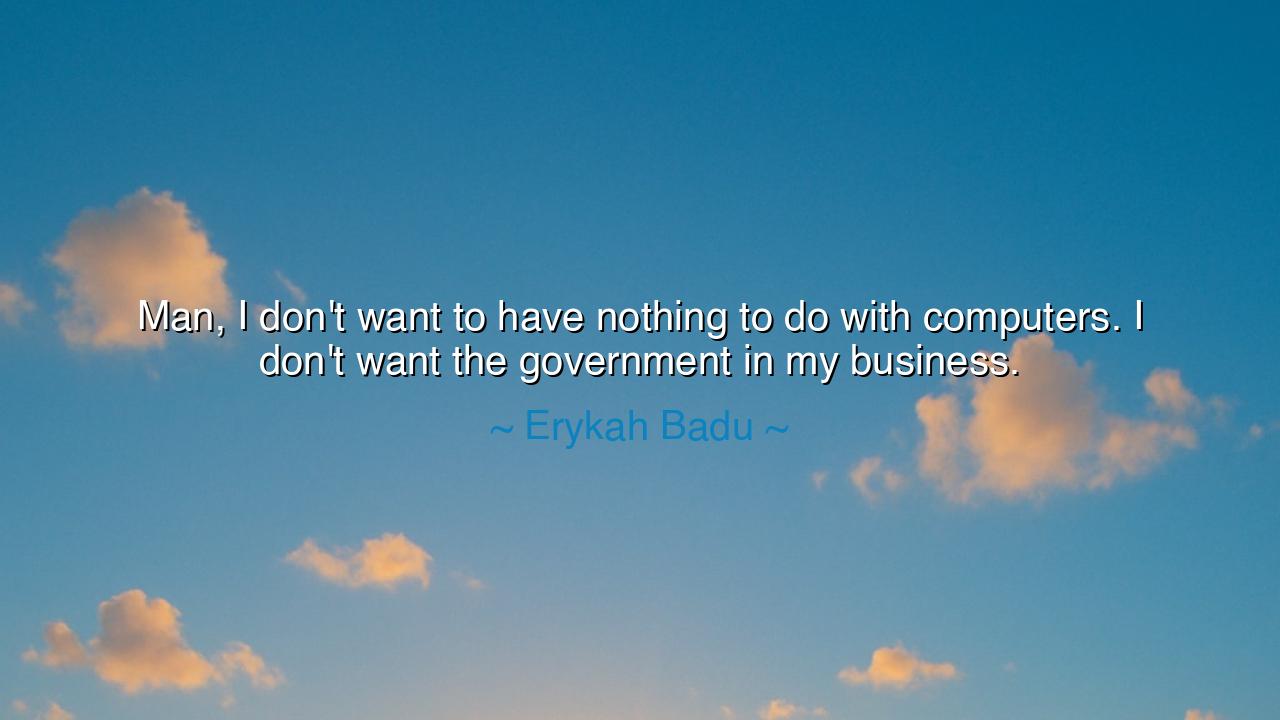
Man, I don't want to have nothing to do with computers. I don't
Man, I don't want to have nothing to do with computers. I don't want the government in my business.






In the modern age, when the world is connected by invisible threads of information, there arises a tension between the pursuit of freedom and the forces that seek to control or manipulate it. The words of Erykah Badu, "Man, I don't want to have nothing to do with computers. I don't want the government in my business," resonate deeply with the age-old human struggle for privacy, autonomy, and independence. Her declaration, though rooted in the context of modern technology, speaks to a much larger truth—one that has echoed throughout the ages: the desire to preserve the sanctity of individual freedom in the face of external forces that seek to encroach upon it.
Throughout history, the question of control has often been at the heart of the struggle for freedom. Socrates, the great philosopher of ancient Athens, was condemned to death for questioning the very foundations of the society in which he lived. His trial was a profound reminder that freedom of thought and action is not easily granted, and those who dare to challenge the prevailing powers often face harsh consequences. In this light, Badu’s words take on a more profound meaning. Just as Socrates resisted the control of the state over his thoughts, Badu resists the growing influence of technology and government over the most personal aspects of her life. Her refusal to engage with computers and the government’s increasing reach into her private affairs is an act of defiance—a cry for personal sovereignty in an age where privacy is becoming an endangered concept.
Consider the story of George Orwell, who foresaw a world in which the government not only watched its citizens but also controlled their thoughts. In his dystopian novel 1984, Orwell created the concept of Big Brother, a government that uses technology to surveil and manipulate the minds of its people. Orwell’s vision is not as far removed from the world we live in today as we might hope. The internet, once a tool for connection and knowledge, has become an arena for mass surveillance, where our every action—our searches, our communications, and even our desires—can be monitored and used to shape our behaviors. In this context, Badu’s desire to distance herself from computers and the government’s reach is not merely about technology; it is a stand for the preservation of individual autonomy.
The ancient Romans had a saying: “Quis custodiet ipsos custodes?”—"Who watches the watchers?" This question, posed by the philosopher Juvenal, speaks to the dilemma of power and oversight. In a world where those in positions of power are often entrusted with monitoring the masses, who ensures that those entrusted with control do not abuse it? The Roman Empire, vast and powerful, was built on a complex system of control, and yet, even it faced the challenge of maintaining the balance between authority and freedom. Just as the Romans sought to maintain order through surveillance and regulation, so too do modern governments and corporations use technology to monitor and manage the masses. Badu’s words reflect this age-old tension between control and freedom, urging us to question who holds the power and to what end it is used.
Consider the story of Benjamin Franklin, a founding father of the United States, who famously said, “Those who would give up essential liberty to purchase a little temporary safety deserve neither liberty nor safety.” Franklin’s warning against the erosion of liberty in the name of security rings as true today as it did in the 18th century. The growing influence of technology in our daily lives, and the increasing power of governments and corporations to access and control our personal information, challenges the very freedoms that Franklin and others fought to protect. Badu echoes this sentiment when she resists the invasion of technology into her life, drawing a line between the pursuit of security and the preservation of personal freedom.
The lesson from Badu’s statement is clear: we must remain vigilant in our defense of personal freedom. In an age where technology can be used to track, control, and influence every aspect of our lives, we must not lose sight of the importance of privacy and autonomy. This is not a call to reject technology altogether, but a call to use it wisely and to ensure that it serves, rather than dominates, our lives. Just as Socrates resisted the control of the state over his thoughts, and Franklin fought to protect the liberties of the individual, we must strive to balance progress with freedom. The true challenge of our time is not the technology itself, but how we allow it to shape our lives and our society.
In practical terms, the message is one of balance and awareness. Just as Badu steps away from the pervasive influence of technology, we too must be mindful of how much we allow it to invade our personal lives. Protect your privacy, understand the ways in which your data is used, and remember that true freedom comes from maintaining control over your own life. Whether it is through limiting your digital footprint, advocating for privacy rights, or simply being mindful of your relationship with technology, we must ensure that we do not sacrifice our liberties for the sake of convenience or safety. Badu’s resistance is not simply a rejection of technology but a reminder to safeguard the sanctity of our personal sovereignty in a world that increasingly seeks to encroach upon it.






AAdministratorAdministrator
Welcome, honored guests. Please leave a comment, we will respond soon